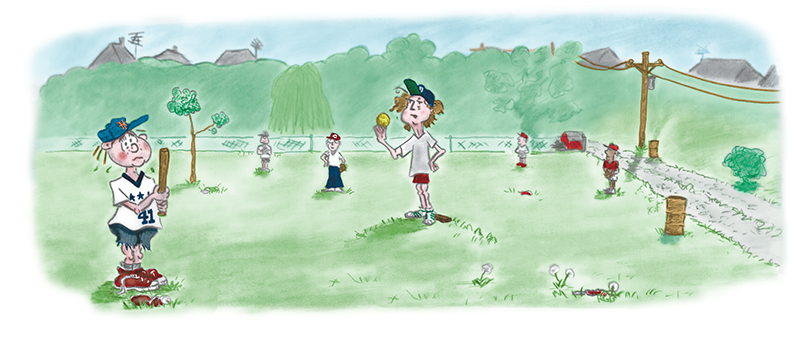(This column was revised and reprinted in the April 2006 issue of Electric Consumer. It first appeared in the April 1989 issue.)
Springtime at last is here! And this middle-aged man’s fancy once again turns to thoughts of … baseball.
To get through the dreary days of winter now passed, I’d often put on the movie “The Natural,” the fable of Roy Hobbs who overcomes time, adversity and his own foibles by walloping the winning home run in the end. And I dug out my videotaped highlights of the amazing comeback by the New York Mets — my favorite team — in Game 6 of the 1986 World Series.
Moments like those make baseball the great game it is. There’s always that hope for the underdogs or the seemingly vanquished that the next pitch, next game or next season will produce victory. It’s that Charlie Brown bubble that springs eternal of swing, swing and swing again.
Like Charlie Brown, I loved playing baseball. And like Charlie Brown, I was horrible at it. But I do have one magical moment of baseball glory. Whenever I relive my playing days, I rummage through my memory and return to a hot, hazy summer afternoon in 1973.
In those days, I was the youngest of our neighborhood gang. The underdog. And in that summer of my 11th year, the older guys decided it was more fun, and safer for the youngest of us, to play baseball with a tennis ball and 21-inch souvenir bats. In doing so, we forsook the real sandlot down the street and turned the backyards of the Varners and a vacant house next door into our new ballpark. Both yards were across the gravel alley from my house.
The bases were strewn around the Varners’ yard. No one really cared about the exact placement. The flattened tin cans moved every time we rounded them anyway. What was important were the home run designations. The home run was our raison d’être, our reason for being. It was the true measure of our manhood.
A home run to short right and right center fields was any ball that landed on the other side of the alley. Left and left center had a real fence, chain link, that separated the backyards of the vacant house and that of an elderly couple who lived another house down. In dead center field where the fence and the alley met was the dog house where the elderly neighbors kept Rex. Rex was a vicious beast who, during that summer, devoured more than one home run ball to land within his domain, the area covered by the length of his chain.
On that particular fateful day, somewhere in the late innings with two outs, our team just barely ahead and suppertime drawing near, our lead-off hitter punched a home run to left field. Our next batter then hit a towering shot to right that ricocheted off a transformer atop a utility pole and landed in my backyard. The next guy drove another home run to left. Back-to-back-to-back homers. It was pretty neat but not unprecedented in those backyard games.
When our fourth hitter sent another ball over the left field fence, however, the stage was set for some baseball history. Four consecutive home runs. Then I came to bat. I always was picked last when sides were chosen and subsequently always batted last in the lineup. It was up to me, a wimpy kind of kid who hadn’t hit a home run all summer, to continue this remarkable streak.
As best anyone there could recollect, never before had an entire team hit consecutive home runs. We figured this was our chance for baseball immortality, a feat worthy of mention at the Baseball Hall of Fame. All we needed was one more homer. All I had to do was hit it.
My palms grew sweaty on the bat as Mark Wellman, the other team’s captain and the oldest of us all, went to the mound. He’d had enough of Brad Varner’s pitching. Though we played slow-pitch to allow the other team to put the ball in play, being shelled was not part of the deal. Despite Brad’s pleas to remain and his confidence in being able to get me out, Mark banished him from the mound. Brad, just a year older than me, got mad and stormed off the field and momentarily into his house. I stepped to the plate.
Mark held the ball out and declared to us all: “If Dickie hits a home run, I’ll eat this ball.”
I swallowed hard.
Mark wound up. He pitched. The dirty yellow tennis ball came toward me.
Suddenly, it started growing in size. My eyes grew wide, then narrowed as I drew a bead. I saw that ball like no ball before or since. It must have been the size of a pregnant pumpkin by the time I swung.
I’m not exactly sure what happened, but I must have gotten all the wood on the ball that tiny Norm Cash-autographed bat could muster. When I opened my eyes, I saw the ball arcing skyward, over Mark’s head, over the vacant yard, soaring to the depths of deepest center field.
Everyone froze in his sneakers, stunned. It was as if I’d just sent the ball hurtling toward one of Mrs. Varner’s windows or something.
The ball seemed to hang in the air forever. Was it going, … going? I must have been rounding first and scampering to second when it finally crashed upon the tin roof of Rex’s house. The sleeping dog flew into a frenzy.
I had done it! I joined my teammates in the home run derby. There was no mud in Joyville! They greeted me with open arms. The guys on the other team just shook their heads in disbelief.
Mark pretended to take a bite out of the ball, but we never made him eat it. He was bigger than us. And we didn’t hit any more home runs that day; the factory whistles blew and suppertime came. Soon after, our ballpark closed for good when a young family moved into the vacant house and took away our left and center fields.
Today, when my family visits my parents and I’m tossing the baseball to my kids, I glance over to those backyards across the alley. I’m reminded how fleeting glory and time really are. Trees have grown up in what were our base paths. Families moved out; others moved in and moved out again. Rex is long gone. But in the gentle breezes wafting by our onetime Elysian Field, I sometimes hear echoes of a bat thumping a tennis ball and a dog barking. Those are the frozen moments that make baseball so special.
Story and illustration by Richard G. Biever, senior editor of Electric Consumer.




